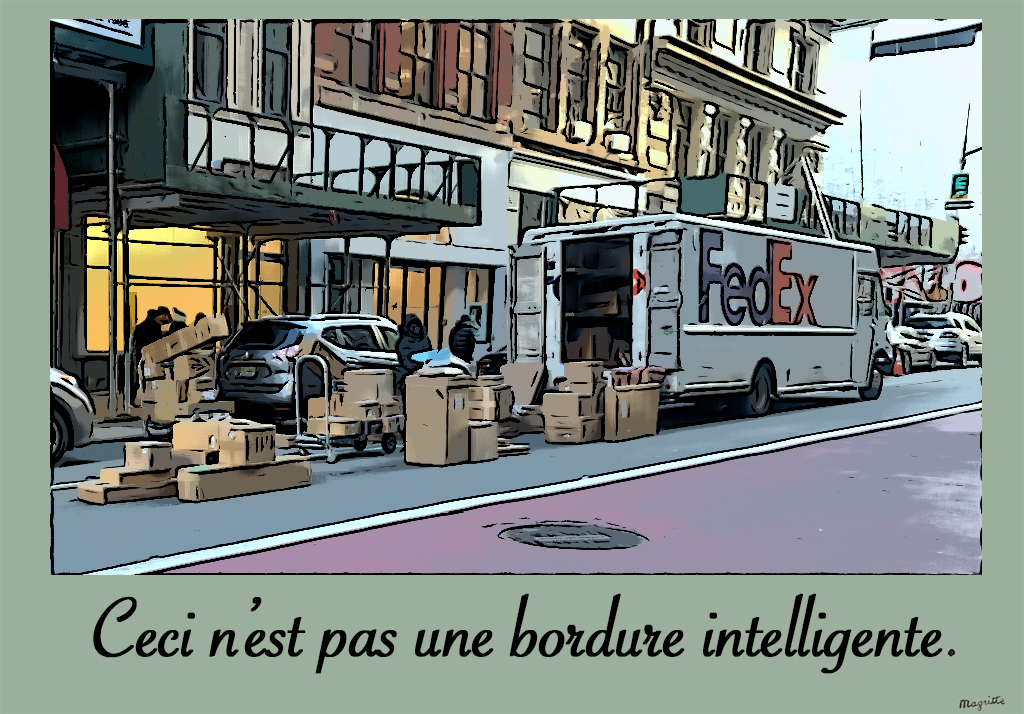A key element of the Department of Transportation's nascent "Smart Curbs" pilot on the Upper West Side appears to be doomed, thanks to interference last month from Deputy Mayor Randy Mastro at the behest of the neighborhood's Council Member Gale Brewer. The reason? To preserve free parking.
Announced in December 2023, the "Smart Curbs" pilot is part of a broader effort by DOT to acknowledge the multitude of users vying for precious curb space across the city. Since the 1950s, the default use of the curb has been to store privately owned automobiles for free, but that paradigm is beginning to shift. Curbside dining, which allows restaurants to serve dozens of diners where a couple of cars previously sat idle, is just one example of how socially and economically valuable that curb space actually is.
"Smart Curbs" tries to go even further by demonstrating and testing other uses for the curb in response to real-world conditions. One of the objectives of the pilot is addressing the proliferation of home deliveries from the likes of Amazon and UPS. By using innovative tools like microhubs, as well as more mundane moves like adding commercial metered parking, the DOT hopes to make a dent in the chronic double parking that creates disorderly and unsafe conditions on the street.
But the curb is a finite resource, and making more space for commercial trucks on Columbus Avenue means relocating a few existing passenger metered parking spots to the side streets. Metered parking creates turnover, which helps those few folks who drive to a business find an open spot when they need it. But those metered spots have to replace something — in this case, a tiny fraction of the neighborhood’s roughly 9,000 “alternate side” (aka, free) parking spots.
Enter Council Member Brewer and a purported chorus of “hundreds, if not thousands” of angry constituents. In her constituent newsletter on Aug. 28, Brewer boasted, "At my request," Mastro "reversed the elimination of 70 alternate-side parking spots.” She claimed this happened in order to accommodate “more public input” and “more public notice.”
But this program has hardly been a secret, nor was it rushed to implementation. There have been multiple opportunities for constituents to give detailed feedback going as far back as January 2024. In fact, the very parking spots in question were presented publicly at Community Board 7 in 2024 and were announced without controversy this past June in the Council Member’s constituent newsletter — the same weekly mailing in which she raised a fuss last month.
Here’s a sincere question for Council Member Brewer: What’s the right amount of “public input” that will convince a constituent to pay for a precious public resource they are accustomed to getting for free?
And what of the 73 percent of households on the Upper West Side that don’t have access to a car? It’s hard for them to contact the Council Member to praise benefits they may never know they’re missing out on because free parking is standing in the way.
Brewer went on to say: “The parking switch was part of the ‘Smart Curbs’ pilot, which aims to ease traffic congestion and improve delivery logistics — a concept I like, but this element of the plan was a fail.”
By what measure was converting these few dozen parking spaces from free to metered “a fail”? How could we possibly know if the changes were working as intended without first trying them out? Isn’t that what a pilot is for?
This sentiment also misses the larger point of the "Smart Curbs" pilot. It’s not solely about easing traffic congestion and improving logistics. It’s also about normalizing a more expansive view of the curb — from a place dominated by inert vehicles to a dynamic, multi-use resource that serves a variety of stakeholders.
That’s not to say the "Smart Curbs" pilot is perfect. For starters, we’d like to see clear benchmarks by which to measure success, something that has been lacking, at least publicly. But more importantly, its main shortcoming is exactly the opposite of Brewer's concern: the scope of the pilot was too modest for the scale of change and innovation that’s needed.
Elected officials are supposed to use their positions to make the agency’s program work better, not undermine it with line-item vetoes that favor a narrow group of constituents at the expense of everyone else.
Gale Brewer has served in public office for more than two decades and knows the workings of city government better than almost anyone, which is why this capitulation to complainers is so disappointing.
This type of political interference also risks compromising future street improvement projects, almost all of which will require converting some amount of free parking to a use that serves a broader and more diverse segment of the community.
As the saying goes, "There is no free lunch," and that’s especially true at the curb — some of the city’s most valuable real estate. The "Smart Curbs" pilot is a small, public step toward creating equity in this contested space. Let’s not allow those few loud voices who would preserve the failed status quo to stand in the way of the change we all need.






